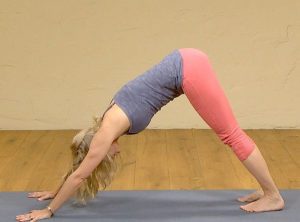
Yoga heart opening poses can be a great way to improve your emotional and physical well-being. If the heart chakra is blocked, you'll experience difficulty loving, forgiveness, or letting go, and you may feel emotionally unstable. You will feel warmth and love emanating from your heart if it is open. You'll find endless possibilities. Here are some poses to try at home. This article will demonstrate how to open the core of your being.
According to the American Heart Association, an activity of at least 30 minutes per day can significantly reduce the risk of cardiovascular disease. The AHA recommends that you do at least 25 minutes of aerobic exercise three times per week. This is 75 minutes total. Yoga and other yoga-type exercises are good for your heart. They're also easy on the joints. It actually increases HRV, or Heart rate variability. This is the measure of how your body reacts to changes within your autonomic nervous. A high level of HRV is associated with a lower rate of cardiac arrhythmia.

The Yoga for Heart pose resembles a chair, and is a great way to stimulate the heart. This pose involves stretching your chest and requires determination. Begin by standing erect, spread your arms out and face your palms upward. Bend your knees, and hold this position for as long as you can. You can modify this pose to help you stay in the position.
Yoga postures help stretch muscles and increase insulin sensitivity, which in turn helps to control blood sugar. The breathing techniques and meditation practices help quiet the nervous system, which is important in reducing blood pressure. Exercises can be beneficial to people with existing heart problems. Yoga postures can help improve cardiovascular health and overall heart health. To improve your physical and mental health, you may practice asanas. So what are waiting for?
The Yoga heart is one of the most important parts of the body. It regulates blood flow and improves the circulatory system. Yoga practice has been shown to lower the risk of stroke. It can prevent strokes by strengthening the heart. The Yoga Heart can help prevent strokes. The Yoga Heart is not meant to replace standard medical treatment. However, it can help you avoid a stroke.

Recent research has shown that yoga is good for the heart. It has been shown to help improve flexibility, increase energy, and improve mood. The body also reaps a number of benefits. It improves flexibility and decreases stress. It's good for your heart. It's one of the best ways for you to be mentally and physically fit. This is because it promotes a healthier heart.
FAQ
Is it true, that too much protein can cause kidney stones?
Protein helps to maintain healthy bones, tissue, and skin. Consuming too much protein can result is calcium excretion via urine. This can cause kidney stones.
Not everyone who eats more than 2g of protein per kilogram (2.2 lbs) of bodyweight will get kidney stones. You don't have to eat a lot of protein to get kidney stones.
By watching how much sodium you consume, kidney stones can be prevented. Sodium helps regulate water balance in the kidneys. Too much sodium results in a higher risk of developing kidney stones.
You may also want to reduce your protein intake in the event of kidney stones. Protein accounts for about half the daily caloric requirement of most adults. If you cut back on protein, you'll likely lose weight.
If you do decide to eat more protein, don't go overboard. Try to eat less than 20% protein in total calories.
Egg is good for you?
All the nutrients that the body needs are found in eggs. It is also good for maintaining strong bones, healthy heart and lungs, as well as stable blood pressure.
Eggs are a good source of protein and vitamins A, B12, D, E K, calcium, phosphorus iron, zinc copper, magnesium selenium and even riboflavin.
The egg yolk is high in cholesterol. The egg yolk does not contain saturated oil. Eggs contain less saturated fat than most other foods.
They are also low on calories and sodium. They can also be prepared in many different ways. They can be poached or scrambled, baked, hard-boiled, or fried.
They are very healthy and simple to make.
Each day, you should consume at least 2 whole eggs. If you dislike eating eggs, you should add them to your diet.
Essential nutrients are provided by eggs. Include eggs in your daily diet.
Do I have to do it every day?
No! At least 30 minutes moderate-intensity exercise five days per week is a good goal. This means that you should be able to walk fast enough to feel slightly out of breath, or bike hard enough to sweat.
What does milk do?
The next time you buy milk, think about what else you could use it for. It might also help if you start drinking less coffee.
The benefits of milk have been demonstrated to be both beneficial to children and adults. Milk provides children with nutrients such as vitamin D, calcium, potassium, phosphorous, and magnesium.
It helps with digestion, promotes weight growth, and improves bone strength. Adults who consume dairy products tend to have fewer illnesses and better immune systems.
Lactose is also a major component of milk, so those who are unable to digest it easily can still enjoy the benefits of this sugar without having stomach problems.
You can drink more milk than you would soda or juice. Your teeth and bones can be strengthened by drinking milk rich in vitamin D and calcium.
If you don't like the taste of milk, you can always make your yogurt using plain low-fat milk. Yogurt can be a great substitute for milk, as it has fewer calories and more protein.
Yogurt also contains probiotics, which aid in digestion and improve immunity.
A glass of warm milk is a great way to get a good night's sleep if you're having trouble getting to sleep. Warm milk can relax muscles and increase serotonin levels. This will help you sleep well.
Is Cardio Better Than Strength Training?
Both are equally effective. For those who want to gain muscle quicker, cardio is a better choice.
Cardio burns far more calories per min than strength training. It also burns fat more efficiently.
Although strength training can increase muscle mass, it is more difficult than cardio to do so.
Statistics
- By John Thompson Take a whopping 38% off a set of PowerBlock Pros. (menshealth.com)
- According to the American Academy of Dermatology (AAD), men over 50 are at a heightened risk of developing it. (healthline.com)
- Get free shipping and 25% off today. (healthline.com)
- The PRS enabled risk stratification for overall prostate cancer and lethal disease with a four-fold difference between men in the highest and lowest quartiles (HR, 4.32; 95% confidence interval [CI], 3.16-5.89). (pubmed.ncbi.nlm.nih.gov)
- Are You One of the 20% of Guys (mh.co.za)
External Links
How To
What nutrients does a man need daily?
Men need healthy growth and development. The body needs vitamins, minerals as well as proteins, carbohydrates and fats.
Specific nutrients are also required by the male body at different times during the day. For example, when you sleep, your body uses energy from food to make hormones, antibodies, and enzymes. Protein is needed to build muscles and repair tissue damaged when you wake up.
Your body burns fat at night and stores it as energy as glycogen. Your body will still need nutrients, but it will require fewer calories during this time. You can have a snack at night if you feel hungry.
When you work out, you need adequate levels of carbs and protein to fuel your muscles. You may feel sore muscles if you exercise hard.
You must ingest carbs and protein within two hours of training to prevent this. To provide energy, your body will begin to break down stored glycogen.
After your workouts, you should eat protein immediately. This will prevent muscle tissue from being damaged while you sleep.
Lactic acid is produced by the body during periods of intense exercise. Your body can build up lactic acid in the bloodstream which causes fatigue. Avoid this by eating foods rich in carbohydrates such as fruits or vegetables.
Carbohydrates are a good source of energy to help you recover from hard exercise.
Additionally, lean meats, fish and eggs, dairy products, yogurt, cream, cheese, yogurt and beans can be added to your diet.
All these foods are high-quality sources of protein. Protein is important for muscle growth and repair. It provides amino acids that your body needs in order to produce sexhormones and testosterone.
A healthy skin, nails and joints requires sufficient dietary fats. Healthy men need to consume between 20%-35% of their total calories from fat.
Fat can help keep your heart healthy and protect you from cancer. It also keeps your brain functioning properly.
You can get the majority of the fats that you need from vegetable oils such as soybean oil.
These oils contain high levels of monounsaturated fat acids (MUFAs). MUFAs are good for lowering cholesterol and reducing inflammation. They also protect your cells from damage caused by free radicals.
Saturated oils (SFAs), found primarily in animal products such meats, dairy products and butter, are known to raise LDL ("bad") cholesterol. SFAs can increase LDL ("bad") cholesterol as well as triglycerides. They can also increase weight and reduce belly fat.
Polyunsaturated oil (PUFAs), which are plant-based, can be found in vegetable oils, nuts seeds, grains, and other plant-based products. PUFAs improve cardiovascular function and decrease inflammation. They also help control blood sugar and cholesterol.
Erectile dysfunction is common in men with low HDL ("good") cholesterol. Consuming high amounts of saturated fats can increase bad cholesterol and lower good cholesterol.
Red meat and pork are a common source of prostate problems in men who eat a lot. When cooked at high temperatures, nitrates can be converted to nitrosamines. These compounds can cause cancer.
Most processed meats contain nitrites or other harmful chemicals. Avoid them.
According to the American Heart Association, you should limit your consumption of red meat to no more that 2 meals per week. Choose poultry, fish and legumes instead.